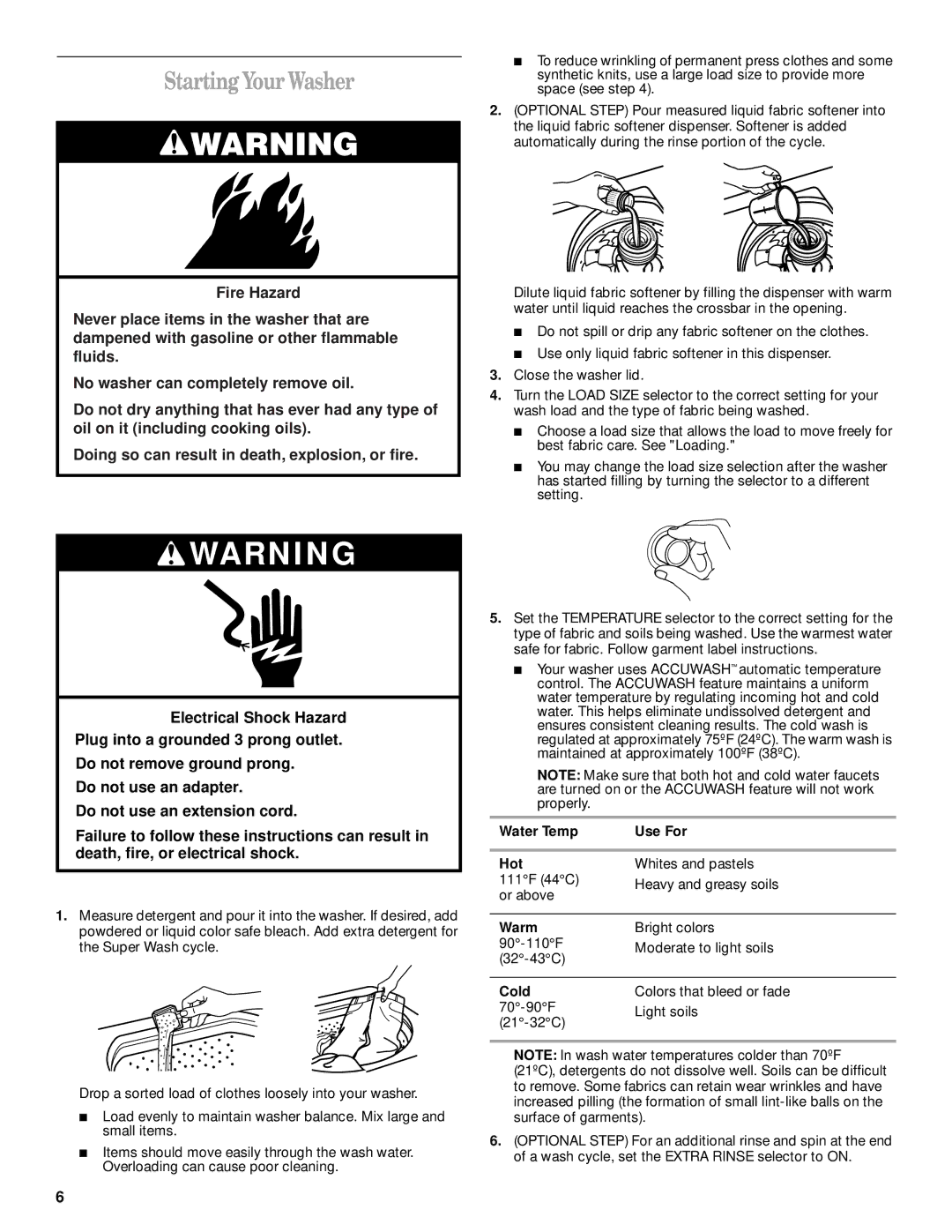
Starting Your Washer
Fire Hazard
Never place items in the washer that are dampened with gasoline or other flammable fluids.
No washer can completely remove oil.
Do not dry anything that has ever had any type of oil on it (including cooking oils).
Doing so can result in death, explosion, or fire.
■To reduce wrinkling of permanent press clothes and some synthetic knits, use a large load size to provide more space (see step 4).
2.(OPTIONAL STEP) Pour measured liquid fabric softener into the liquid fabric softener dispenser. Softener is added automatically during the rinse portion of the cycle.
Dilute liquid fabric softener by filling the dispenser with warm water until liquid reaches the crossbar in the opening.
■Do not spill or drip any fabric softener on the clothes.
■Use only liquid fabric softener in this dispenser.
3.Close the washer lid.
4.Turn the LOAD SIZE selector to the correct setting for your wash load and the type of fabric being washed.
■Choose a load size that allows the load to move freely for best fabric care. See "Loading."
■You may change the load size selection after the washer has started filling by turning the selector to a different setting.
![]() WARNING
WARNING
Electrical Shock Hazard
Plug into a grounded 3 prong outlet.
Do not remove ground prong.
Do not use an adapter.
Do not use an extension cord.
Failure to follow these instructions can result in death, fire, or electrical shock.
1.Measure detergent and pour it into the washer. If desired, add powdered or liquid color safe bleach. Add extra detergent for the Super Wash cycle.
Drop a sorted load of clothes loosely into your washer.
■Load evenly to maintain washer balance. Mix large and small items.
■Items should move easily through the wash water. Overloading can cause poor cleaning.
5.Set the TEMPERATURE selector to the correct setting for the type of fabric and soils being washed. Use the warmest water safe for fabric. Follow garment label instructions.
■Your washer uses ACCUWASH™ automatic temperature control. The ACCUWASH feature maintains a uniform water temperature by regulating incoming hot and cold water. This helps eliminate undissolved detergent and ensures consistent cleaning results. The cold wash is regulated at approximately 75ºF (24ºC). The warm wash is maintained at approximately 100ºF (38ºC).
NOTE: Make sure that both hot and cold water faucets are turned on or the ACCUWASH feature will not work properly.
Water Temp | Use For | |
|
| |
Hot | Whites and pastels | |
111°F (44°C) | Heavy and greasy soils | |
or above | ||
| ||
|
| |
Warm | Bright colors | |
Moderate to light soils | ||
| ||
|
| |
Cold | Colors that bleed or fade | |
Light soils | ||
|
NOTE: In wash water temperatures colder than 70ºF (21ºC), detergents do not dissolve well. Soils can be difficult to remove. Some fabrics can retain wear wrinkles and have increased pilling (the formation of small
6.(OPTIONAL STEP) For an additional rinse and spin at the end of a wash cycle, set the EXTRA RINSE selector to ON.
6
